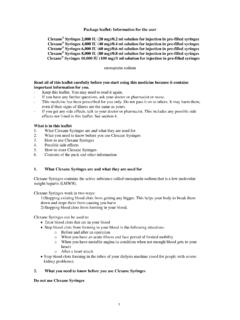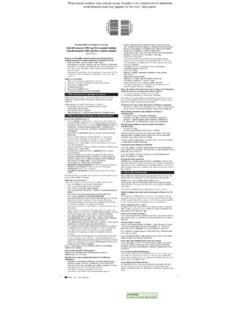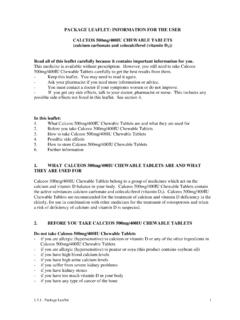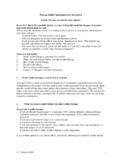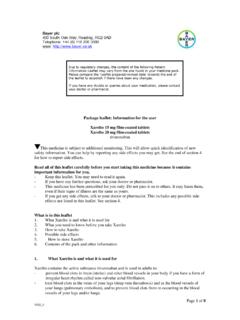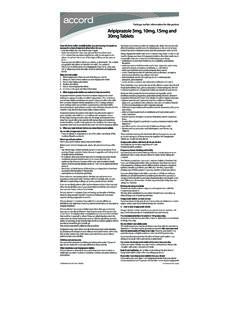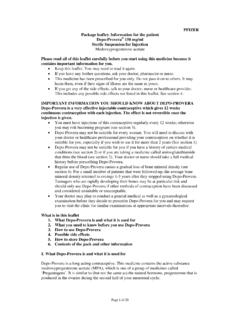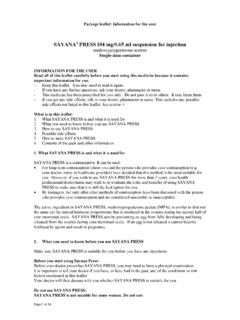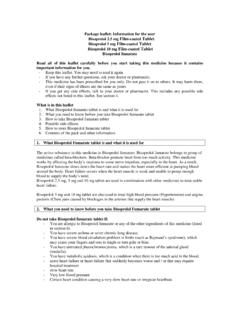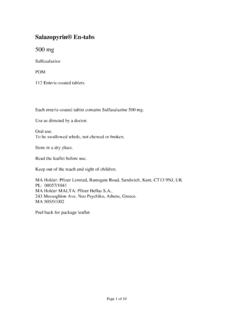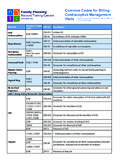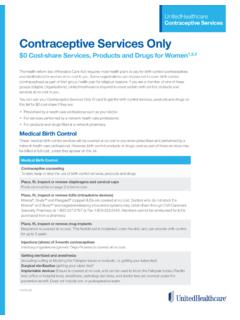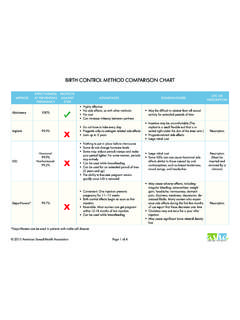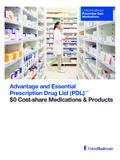Transcription of Package leaflet: Information for the user Important …
1 1 Package leaflet : Information for the user EVRA 203 micrograms/24 hours + micrograms/24 hours transdermal patch norelgestromin/ethinyl estradiol Important things to know about combined hormonal contraceptives (CHCs): - They are one of the most reliable reversible methods of contraception if used correctly. - They slightly increase the risk of having a blood clot in the veins and arteries, especially in the first year or when restarting a combined hormonal contraceptive following a break of 4 or more weeks. - Please be alert and see your doctor if you get symptoms of a blood clot (see section 2 Blood clots ).
2 Read all of this leaflet carefully before you start using this medicine because it contains Important Information for you. - Keep this leaflet . You may need to read it again. - If you have any further questions, ask your doctor, pharmacist or nurse. - This medicine has been prescribed for you only. Do not pass it on to others. It may harm them. - If you get any side effects, talk to your doctor, pharmacist or nurse. This includes any possible side effects not listed in this leaflet . See section 4. What is in this leaflet 1. What EVRA is and what it is used for 2.
3 What you need to know before you use EVRA 3. How to use EVRA 4. Possible side effects 5. How to store EVRA 6. Contents of the pack and other Information 1. What EVRA is and what is it used for EVRA contains two types of sex hormones, a progestogen called norelgestromin and an oestrogen called ethinyl estradiol. Because it contains two hormones, EVRA is called a combined hormonal contraceptive . It is used to prevent pregnancy. 2. What you need to know before you use EVRA General notes Before you start using EVRA you should read the Information on blood clots in section 2.
4 It is particularly Important to read the symptoms of a blood clot - see section 2 Blood clots . When you should not use EVRA You should not use EVRA if you have any of the conditions listed below. If you do have any of the conditions listed below, you must tell your doctor. Your doctor will discuss with you what other form of birth control would be more appropriate. if you have (or have ever had) a blood clot in a blood vessel of your legs (deep vein thrombosis, DVT), your lungs (pulmonary embolus, PE) or other organs; if you know you have a disorder affecting your blood clotting - for instance, protein C deficiency, protein S deficiency, antithrombin-III deficiency, Factor V Leiden or antiphospholipid antibodies; if you need an operation or if you are off your feet for a long time (see section Blood clots ); 2 if you have ever had a heart attack or a stroke.
5 If you have (or have ever had) angina pectoris (a condition that causes severe chest pain and may be a first sign of a heart attack) or transient ischaemic attack (TIA temporary stroke symptoms); if you have a disease that may increase your risk of a clot in the arteries: - severe diabetes with blood vessel damage - very high blood pressure - a very high level of fat in the blood (cholesterol or triglycerides) - a condition known as hyperhomocysteinaemia if you have (or have ever had) a type of migraine called migraine with aura ; if you are allergic to norelgestromin, ethinyl estradiol or any of the other ingredients of this medicine (listed in section 6); if you have ever been told you might have breast cancer or cancer of the womb, cervix or vagina; if you have ever had liver tumours or a liver disease because of which your liver does not function properly; if you have unexplained vaginal bleeding; if you have hepatitis C and are taking the medicinal products containing ombitasvir/paritaprevir/ritonavir and dasabuvir (see also in section Other medicines and EVRA ).
6 Do not use this medicine if any of the above applies to you. If you are not sure, talk to your doctor, pharmacist or nurse before using this medicine. When to take special care with EVRA When should you contact your doctor? Seek urgent medical attention if you notice possible signs of a blood clot that may mean you are suffering from a blood clot in the leg ( deep vein thrombosis), a blood clot in the lung ( pulmonary embolism), a heart attack or a stroke (see Blood clot [thrombosis] section below). For a description of the symptoms of these serious side effects please go to How to recognise a blood clot.
7 Warnings and precautions Before using this medicine, you will need to see your doctor for a medical check-up. Tell your doctor if any of the following conditions apply to you. If the condition develops, or gets worse while you are using EVRA, you must tell your doctor. if you have Crohn s disease or ulcerative colitis (chronic inflammatory bowel disease); if you have SLE (systemic lupus erythematosus; a disease affecting your natural defence system); if you have haemolytic uraemic syndrome (HUS - a disorder of blood clotting causing failure of the kidneys); if you have sickle cell anaemia (an inherited disease of the red blood cells); if you have elevated levels of fat in the blood (hypertriglyceridaemia) or a positive family history for this condition.
8 Hypertriglyceridaemia has been associated with an increased risk of developing pancreatitis (inflammation of the pancreas); if you need an operation, or you are off your feet for a long time (see in section 2 Blood clots ); if you have just given birth you are at an increased risk of blood clots. You should ask your doctor how soon after delivery you can start taking EVRA; if you have an inflammation in the veins under the skin (superficial thrombophlebitis); if you have varicose veins. 3 BLOOD CLOTS Using a combined hormonal contraceptive such as EVRA increases your risk of developing a blood clot compared with not using one.
9 In rare cases a blood clot can block blood vessels and cause serious problems. Blood clots can develop in veins (referred to as a venous thrombosis , venous thromboembolism or VTE) in the arteries (referred to as an arterial thrombosis , arterial thromboembolism or ATE). Recovery from blood clots is not always complete. Rarely, there may be serious lasting effects or, very rarely, they may be fatal. It is Important to remember that the overall risk of a harmful blood clot due to EVRA is small. HOW TO RECOGNISE A BLOOD CLOT Seek urgent medical attention if you notice any of the following signs or symptoms.
10 Are you experiencing any of these signs? What are you possibly suffering from? swelling of one leg or along a vein in the leg or foot especially when accompanied by: - pain or tenderness in the leg which may be felt only when standing or walking; - increased warmth in the affected leg; - change in colour of the skin on the leg turning pale, red or blue. Deep vein thrombosis sudden unexplained breathlessness or rapid breathing; sudden cough without an obvious cause, which may bring up blood; sharp chest pain which may increase with deep breathing; severe light headedness or dizziness; rapid or irregular heartbeat; severe pain in your stomach.
